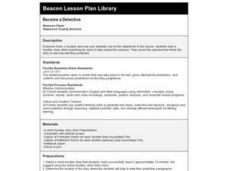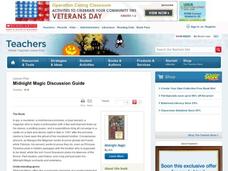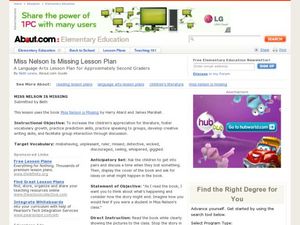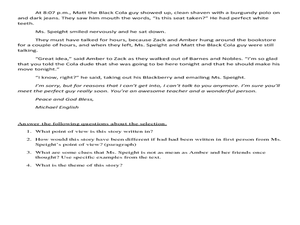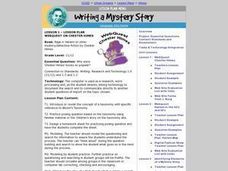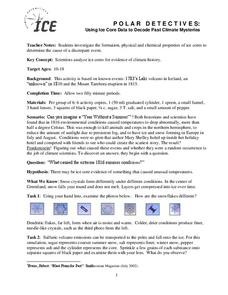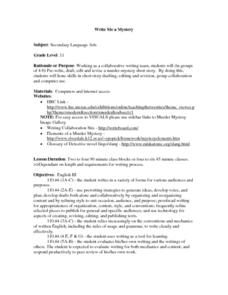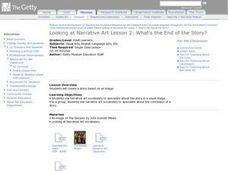Curated OER
Become a Detective
Learners participate in a simulation where they act as detectives to locate a missing item using questioning and prediction techniques. Then they read a portion of a story, write a prediciton paragraph, and then finish reading the story.
Curated OER
Developing Thinking and Reasoning Skills in Primary Learners Using Detective Fiction
Students are introduced to the genre of detective fiction. Based on their reading level, they are given a different series of books to read. For each story, they are to make predictions and practice decoding messages. To end the...
Curated OER
It's A Mystery To Me
Students become both mystery readers and writers. They utilize the Internet to understand the elements of this classic genre; employ critical thinking skills when reading various stories in both print and electronic formats; form groups...
Curated OER
Journal Writing Idea - Pets
Carve out some time for your youngsters to write in their journal. Today, they write a story about pets. They learn the value of a journal and how to keep up with it, and they enhance story development by planning their story before...
Scholastic
Midnight Magic Discussion Guide
This discussion guide accompanies the fiction book Midnight Magic written by Avi, enforces story elements, inferences, and theme/plot. Have the class work on it over time, it will engage even your reluctant readers.
Curated OER
Classic Short Stories- Locked Room Settings
Students read the short story "The Problem of Cell 13" and examine the plot devices that build suspense. In this lesson students create their own short story using the same locked room setting.
PBS
1000 Words
A picture really can speak a thousand words—no matter how old! Scholars become history detectives as they learn how to analyze historical photos and evidence to uncover the past. The fun hands-on activity makes history come alive through...
PBS
The Sixties: Hitsville USA
James Jamerson. You probably heard him but may not have heard of him. But fans of Motown Records will certainly recognize his contributions to the sound that desegregated popular music during the 1960s. Challenge young history detectives...
PBS
Family History: On Your Honor
What is your history? Scholars work with their own families to create a unique story of the courage and bravery of their ancestors. The third and final part of the series culminates in a creation of not just a family history, but a...
PBS
How to Teach Your Students about Fake News
What media literacy skills do people need to evaluate a news source? Scholars listen to and discuss an NPR story about how fake headlines often dupe young people and adults alike. Next, they study news stories, using a fact-checking...
Curated OER
Miss Nelson is Missing Lesson Plan
Second graders listen to the story Miss Nelson is Missing by Harry Allard and James Marshall. In this literature lesson, 2nd graders predict the story's ending with drawings and discussions within groups.
Curated OER
The Meanest English Teacher Ever
Upper graders will use a reading comprehension worksheet about the meanest teacher to practice comprehension. They will read a 5 page story titled The Meanest English Teacher Ever and answer 4 comprehension questions about it.
Curated OER
Investigating Jack London's White Fang: Nature and Culture Detectives
Students explore images of the Klondike and read Jack London's White Fang to become culture and nature detectives. In this novel analysis lesson plan, students analyze the setting of the novel and the ways London portrays nature and...
Curated OER
WebQuest on Chester Himes
Pupils perform a WebQuest to find out why Chester Hime's detective books were so popular. Small groups perform the research together then report to the class.
Scholastic
Follow the Clues
Invite your text detectives to bring their magnifying glasses to school to examine the clues in a text and make predictions. They write down three clues and a prediction on the graphic organizer.
It's About Time
How Electrons Determine Chemical Behaviors
Lead the class on an investigation as they play detective and locate patterns in the electron arrangement of atoms. During the seventh lesson, they assign valence numbers to elements, organize the periodic table in the correct sequence,...
Polar Trec
Polar Detectives: Using Ice Core Data to Decode Past Climate Mysteries
How does examining an ice core tell us about weather? Learners set up and explore fake ice cores made of sugar, salt, and ash to represent historical snowfall and volcanic eruptions. From their setups, scholars determine what caused the...
Curated OER
Write Me a Mystery
Eleventh graders, in groups, pre-write, draft, edit and revise a murder mystery short story to hone their skills in short story drafting, editing and revision, group collaboration and computer usage. They also evaluate writing for both...
Curated OER
Underwater Descriptive Detectives
First graders utilize descriptive words to convey ideas in writing. After hearing the story, 'Rainbow Fish,' students create their own fish books. The books contain original writing and illustrations.
Curated OER
Pattern Detectives
Students discover patterns in language, math and science. They experience patterns by hearing stories, and becoming pattern detectives.
Curated OER
Looking At Narrative Art Lesson 2: How Does The Story End?
Pupils use narrative art vocabulary to speculate about the story in a visual image. In a group, students use narrative art vocabulary to create a story with an ending. They view images imbedded in this lesson plan.
Curated OER
Exploring the Mystery Genre
Students determine the story elements of typical mystery stories including characters and plot structure. They look at vocabulary that is common to mystery stories before reading and responding to mystery chapter books. Working in guided...
Curated OER
Fact and Opinion Detectives
Third graders see how to distinguish facts from opinions in a child's news magazine. After a lecture/demo, 3rd graders utilize a sample story and a worksheet which gives them practice in distinguishing fact from opinion.
Environmental Protection Agency (EPA)
How Much Water Do You Use?
Incorporate reading strategies, math, research, and the scientific method into one lesson about water conservation. After reading a story about a landlady trying to determine how many people are living in an apartment, learners develop a...
Other popular searches
- Detective Stories Doyle
- Detective Stories Authors
- Literacy Detective Stories
- Genre Detective Stories
- Narrative Detective Stories
- Detective Stories Sumeery
- Detective Stories Summery
- Detective Stories Scooby Doo
- Detective Stories Scabby Door


